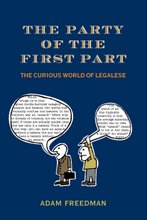
Spitzerfreude
Okay, not exactly a legal word but very close. It's what they call a "portmanteau" word, that is a merger of two existing words -- like, say, advertorial. It's a blend of Elliot Spitzer and schadenfreude, the splendid German word meaning "malicious enjoyment in the misfortune of others." Spitzerfreude (sometimes spelled Spitzenfreude) is defined as "malicious enjoyment in the misfortune of Client 9."
Meanwhile, as speculation mounts that Spitzer might plead to a Mann Act violation, it's worth noting that the original name of the statute was the "Mann White Slave Trade Traffic Act" -- "white slavery" being a nineteenth century term for the act of forcing young women in prostitution.
